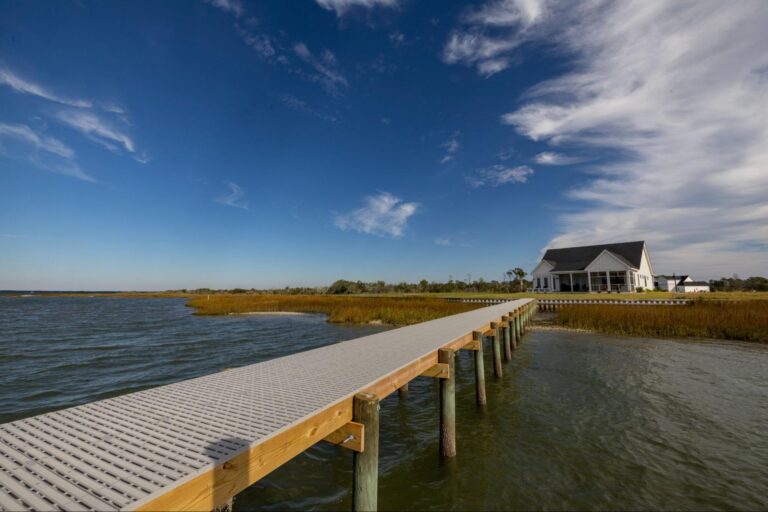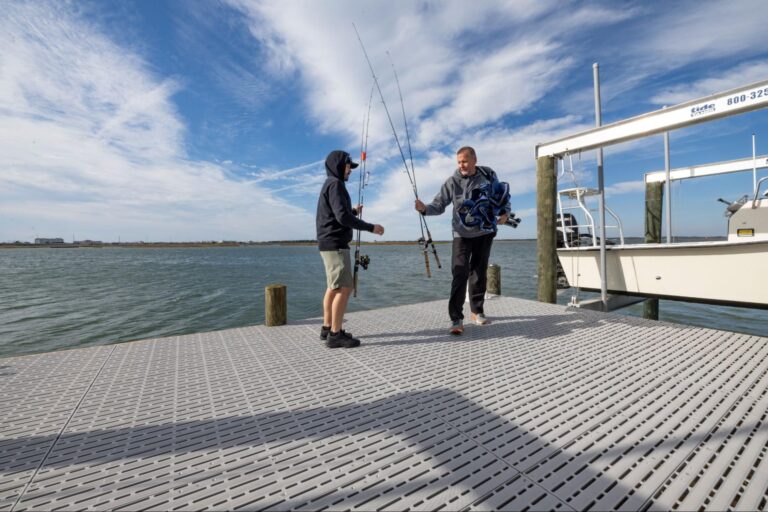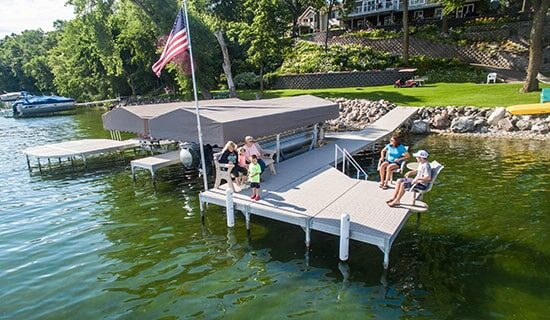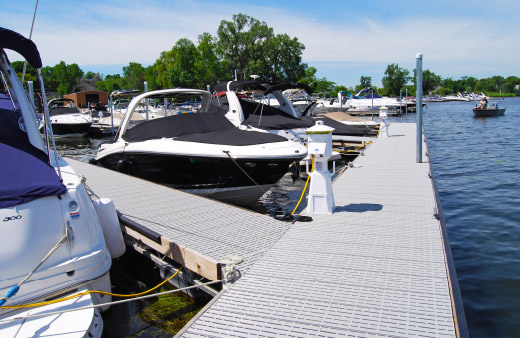Waterfront homes are designed to impress on all levels. From their breathtaking property to their picturesque views, these homes deliver attraction after attraction. But what is one alluring feature that no waterfront home should go without? A breathtaking dock design made from the best decking material available.
Whether you’re a homeowner or a professional who elevates waterfront properties with beautiful dock builds, you know that any waterfront home deserves a dock that adds both aesthetic appeal and outstanding performance for ultimate function.
But what’s the best way to ensure a dock design delivers both? It’s all about what the dock is made of — it needs high-quality materials that match its given environment and intended purpose, enhancing the beauty of your waterfront space while also ensuring safety, comfort and longevity.
Consider The Environment and Preferred Dock Style

Before choosing the right dock decking material, homeowners need to establish the dock style they’re after. Whether it’s an old-fashion wooden dock or a durable concrete pier that can face the toughest challenges of seaside life, the desired style will require different materials. The right waterfront dock decking material depends on the location, depth of water and the types of aquatic activities expected to take place. A quick example to get us started, saltwater locations demand materials that can resist corrosion and UV damage, while freshwater docks might prioritize low maintenance, splinter free surfaces. Now, let’s dive deeper!
How Will The Dock Be Used?
Fishing Docks

When it comes to recreational fishing, a stationary dock with a T or L shape design is generally the best option. This design provides ample space for multiple anglers to cast their lines from different angles and can also provide a sheltered area for cleaning fish and storing gear.
A stationary dock can be made from a variety of materials, including wood, composite decking and polypropylene plastic, depending on preference and budget. It’s important to choose a material that is durable, slip-resistant and easy to maintain, as well as resistant to weather and water damage, making composite decking and polypropylene dock boards ideal choices for fishing dock decking material. Polypropylene decking, like Titan Deck, adds another layer of safety by offering excellent traction even when wet, a key advantage for anglers moving around with gear.
Other features can also enhance its functionality for fishing. For example, rod holders, storage compartments and lighting can make fishing more convenient and enjoyable. It’s also important that the dock is designed to accommodate the size and weight of the boats and other watercraft.
Boating Docks
For boaters, safety and functionality are everything, which is why it’s important to choose a dock with durable, slip-resistant decking material like polypropylene to prevent accidents, and the dock needs to be properly anchored. In addition, the dock should be designed to accommodate the size and weight of the boats and other watercraft.
Some other features that can enhance a dock’s functionality for boating include built-in cleats and bollards for securing the boats, as well as electrical outlets for charging batteries or powering accessories. It’s also important to ensure that the dock is designed to withstand the wave action and weather conditions in the area. Titan Deck boards are engineered to handle high load capacities, making them ideal for boaters who need structural strength and lasting performance.
Entertaining Docks
Another great dock use is to be a captivating entertainment space, designed to provide comfort and enjoyment for family and friends. Guests can relax and enjoy the view and the company. When choosing a dock with entertainment in mind, it is also important to select seating for comfort, as well as kid-friendly materials, in order to ensure that it remains free from splintering and is cool underfoot, even on sunny summer days. UV-resistant decking like polypropylene stays cool underfoot and adds comfort and style to your space.
Additionally, by adding accessories such as a sink and a grill, a perfect setting can be created for outdoor culinary adventures and many shared meals. Whether hosting lively gatherings, indulging in delicious feasts or simply basking in the joy of outdoor festivities, the deck promises to be a delightful entertainment hub that caters to everyone’s interests and becomes an extension of the home’s living space. Polypropylene decking from Titan Deck also comes in stylish board patterns that elevate the design of any outdoor entertainment space, combining visual appeal with functionality.
Work and utility docks
Finally, the dock can also serve as a functional workspace for those involved in aquaculture. The dock should be tailored for demanding tasks, such as loading and unloading equipment, especially those with crab pots, oyster beds, clam beds and more. Beyond its primary role, it can also provide essential storage for nets, pots and other tools, making sure that the working environment is streamlined and organized.
A dock for this purpose needs to be constructed from robust materials, designed to withstand the rigors of daily use. The dock needs to prove its resilience by effortlessly enduring the strain of pulling crab pots, oyster and clam baskets and other demanding operations. With an emphasis on practicality and durability, this dock will become an indispensable hub for labor-intensive activities by providing reliability and efficiency to those who rely on it on a daily basis. Polypropylene boards are again a top choice due to their strength, chemical resistance, and low maintenance needs.
Decking Materials

Once the dock design is selected, it’s time to choose the best decking material. There’s a plethora of options out there, so let’s briefly survey the pros and cons of the most popular decking materials for private docks.
Wood Decking for Waterfront Decks
Wood decking can provide a warm, natural look that fits well with many waterfront homes, making it a popular choice for traditional dock builds. Depending on the type used, wood can be less expensive than many other decking materials, making it a budget-friendly choice upfront.
However, wood decking does require regular cleaning, sealing and staining to prevent rot, decay and warping from exposure to moisture and sunlight. Even with proper maintenance, wooden marine decks typically have a shorter lifespan than other decking materials, and may need to be replaced every 10-15 years. Wooden private docks can also be vulnerable to insect damage, particularly termites and marine borers, which can significantly reduce their lifespan. It is important to note that even treated lumber can struggle in saltwater conditions over time, especially when compared to synthetic alternatives.
Best use case: Low-traffic residential docks where immediate budget and aesthetics are the priority.
Aluminum Decking for Waterfront Decks
Aluminum is highly durable and can withstand harsh weather conditions, including strong winds and saltwater exposure. Aluminum is a lightweight material, which can make installation easier and faster than with heavier materials like wood. The catch with aluminum decking is that aluminum decking is typically more expensive than traditional wood decking. Aluminum also absorbs a ton of heat, which can make it uncomfortable if not impossible to walk on barefoot during the summer. Another issue is the loud sounds produced when people walk on it. Some aluminum decking also lacks the texture needed for adequate grip, especially when wet, a consideration for safety in high-traffic or for family friendly docks.
Best use case: High-performance docks needing long term durability with minimal exposure to foot traffic.
Composite Decking for Waterfront Decks
Usually, homeowners pick composite decking because it replicates the look of wood without the hassle and upkeep that comes with a wooden deck. Composite decking is highly durable and can withstand exposure to saltwater, UV rays and harsh weather conditions.
However, composite decking can be more expensive than traditional wood decking, and like aluminum, composite decking has a heat absorption problem. Composite decking can also sometimes have a manufactured look and can be prone to staining, particularly in areas with high humidity, such as the coasts. While composite is often marketed as low maintenance, some brands still require occasional sealing or can experience mold buildup in humid environments.
Best use case: Mid-to high-end residential docks where style and durability are both important.
Polypropylene Decking for Waterfront Decks

Polypropylene decking, like that offered by Titan Deck, is a popular choice for waterfront decks due to its durability, low-maintenance and cost-benefit advantages. Polypropylene decking is highly durable and can withstand exposure to saltwater, UV rays and harsh weather conditions. It is also resistant to rot, mold and mildew.
Polypropylene decking requires little maintenance beyond occasional cleaning and does not require staining or sealing like wood decks do. Although polypropylene decking can be more expensive than traditional wood decking, it offers a significant cost-benefit advantage in the long run. Due to its durability and resistance to wear and tear, polypropylene decking requires less frequent replacement and maintenance than other materials, leading to cost savings over time.
Titan Deck marine decking boards are designed for exceptional performance and durability, as proven by rigorous testing. In impact tests, Titan Deck boards demonstrated up to 80% better impact resistance compared to competitive products, showing fewer cracks and deformations after drop tests simulating real-world abuse. Flexural strength testing also showed that Titan boards can endure significant bending and pressure without breaking, making them ideal for heavy-duty and high-traffic use.
One of the most unique benefits of polypropylene decking is its resistance to heat absorption — no need to worry about scalding feet during the summer. Polypropylene decks from Titan Deck are built to be the last marine decking homeowners will ever need.
For more information on various polypropylene plastic marine decking solutions, check out Titan Deck’s marine decking solutions and speak to a Titan Deck expert for more information.
Best use case: Any dock requiring superior performance, longevity, and safety with low maintenance.
best Marine decking for residential waterfronts

When it comes to residential waterfront properties, decking is not just a practical element, it is an extension of the home’s beauty and lifestyle. From morning coffee on the dock to late night stargazing, the right marine decking enhances every moment spent by the water.
For homeowners looking to create a safe, stylish, and long lasting dock space, polypropylene decking stands out as the best all-round option. Unlink wood, which demands frequent upkeep, or aluminum and composite, which can become uncomfortably hot underfoot, polypropylene delivers the perfect blend of comfort, durability and aesthetics.
Titan Deck’s polypropylene decking is specifically engineered and tested to meet the high standards and needs of residential waterfront applications. Flexural testing confirms Titan Deck boards can bear significant loads and pressure without cracking. Impact testing shows they outperform competitors in durability, making them a reliable choice for families with children or pets where safety and long-term performance matters. Titan Deck’s polypropylene decking is slip resistant, making it safer for families and pets, and it stays cool and barefoot friendly even on the hottest summer days. In addition it is easy to install and nearly maintenance free while being designed with long term value in mind. Plus, with several board style options available, homeowners can find the perfect look to complement their shoreline and home. Homeowners can feel confident knowing their dock will not just look great, it will also perform reliably for years to come, even in harsh marine environments, delivering exceptional value and standout shore appeal.
For those building or upgrading docks at their waterfront homes, choosing the right decking makes all the difference. Titan Deck’s polypropylene marine decking delivers beauty, function, and peace of mind, making it the smart choice for homeowners who want the very best for their outdoor space.
best Marine decking for redecking
Re-decking offers a smart and cost effective way to refresh an existing dock structure without the expense or time commitment of a full rebuild starting from scratch. If your dock’s substructure is still in good shape and you are looking to upgrade, the decking you choose makes all the difference in performance and longevity.
For re-decking projects, polypropylene decking is hands down the best material to use. It is lightweight, easy to work with, and installs quickly, all essential factors when retrofitting onto existing frames. Titan Deck boards can be attached to existing wood, aluminum or steel substructures with basic tools, making them a convenient solution for DIYers and pros alike with fast installation and high durability.
Backed by flexural strength and impact testing, Titan Deck polypropylene boards deliver structural confidence and high performance on any dock retrofit. Even when installed over older frames, the decking resists sagging and cracking under daily use, ensuring a longer lasting result than traditional materials.
Whether you are extending the life of a family dock or updating a rental property’s shoreline appeal, Titan Deck makes it easy to breathe new life into tired decking. With multiple styles to choose from, it is simple to match your existing look, or upgrade to something completely new.
best Marine decking for Commercial Waterfront Docks and Marinas

Commercial waterfront spaces, such as marinas, public piers, boat launches, fishing docks, and waterfront resorts, face a different set of challenges than residential properties. These environments demand decking materials that can withstand heavy foot traffic, rough use, and exposure to extreme weather conditions, all while maintaining safety and low maintenance with high performance expectations.
This is where Titan Deck’s polypropylene decking truly shines. Built with commercial durability in mind, Titan Deck boards are engineered to support heavy traffic and resist damage from sun, saltwater, moisture, and impact. This performance is backed by lab-testing flexural and impact results that confirm its ability to endure daily commercial use without cracking, warping, or wearing down. The decking performs has proven to perform well in real world use under the strain of carts, foot traffic, and shifting weather, keeping boardwalks and piers looking professional and safe for all users.
From marinas to waterfront restaurants, businesses choose Titan Deck because it combines long lasting strength with low lifetime costs. With minimal maintenance and no need for painting, sealing or frequent replacement, polypropylene decking reduces labor and maximizes uptime and minimizes costs, a win for any commercial operator.
Choosing best Marine decking for your project
Whether you are building a new dock or upgrading an existing one, choosing the best decking material for waterfront homes makes all the difference. Titan Deck’s polypropylene marine decking offers unmatched durability, style, and ease, making it the top choice for anyone serious about creating a functional, beautiful, and long-lasting dock.
Learn more about Titan Deck’s marine decking solutions and contact a Titan Deck expert to find the perfect decking materials for your waterfront home or project.
